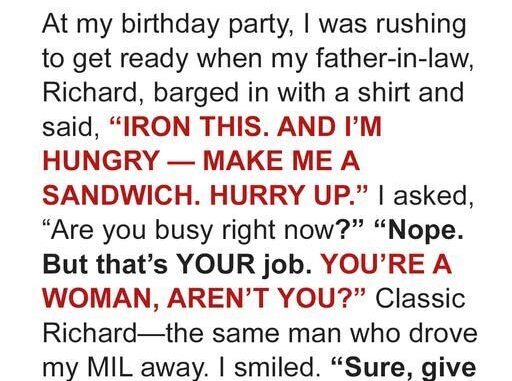
On the day of my 30th birthday, while I was frantically trying to get ready for the celebration, my father-in-law, Richard, burst into my room uninvited. Without so much as a greeting, he tossed a wrinkled shirt on my bed and barked, “Iron this. And I’m hungry—make me a sandwich. Hurry up.”
I stared at him, half-dressed, towel on my head, eyeliner in progress. “Are you doing anything right now?”
“Nope,” he replied flatly. “But that’s your job. You’re a woman, aren’t you?”
Classic Richard. The same man whose outdated thinking helped drive my mother-in-law away. I gave him a tight smile. “Sure. Just give me a few minutes.”
Fifteen minutes later, I handed him his sandwich and his neatly pressed shirt.
Seconds after biting into it, he gagged and coughed dramatically, spitting into a napkin like a toddler who just discovered broccoli.
Let me rewind a bit.
My birthday plans were simple: a relaxed evening with close friends and family, good food, music, and maybe a homemade cake courtesy of my best friend, Lena. But Richard had other plans. He barged into my space while I was getting dressed and demanded I drop everything to serve him.
This wasn’t confusion or forgetfulness. Richard is perfectly capable—just stuck in a 1950s mindset. He genuinely believes that women should cook, clean, and cater to men. He’s the kind of guy who mocks “fancy” food and thinks socks with sandals are a fashion statement.
Still, I responded calmly. “Give me a few minutes.”
I wasn’t raised to embarrass others, but I do believe in thoughtful consequences. So, I complied—with a little twist.
Knowing his disdain for “modern” food, I made him a sandwich exactly the way he always claimed was proper: three slices of dry white bread, one pitiful slice of ham, and the hottest German mustard I could find—brought by my brother and labeled with a warning for a reason.
I even trimmed the crusts, just the way he likes it.
One bite and he practically combusted. “Did you put poison in this?!” he choked.
“Nope,” I said sweetly. “Just German mustard. Want some milk?”
He stormed out red-faced, clutching his water bottle. The guests noticed but said nothing. My husband, Matt, gave me a knowing look but stayed silent—he recognized the signs of my “polite revenge mode.”
The rest of the night was lovely. Good food, dancing, and Lena’s decadent espresso cake. Richard stayed sulking on the patio, refusing to eat or speak.
Later, while I was tidying up, Matt came over and asked if I was okay. I nodded. He looked toward his father and sighed.
“I know he’s difficult,” he said. “But he’s still my dad.”
“And I’m your wife,” I replied gently. “I won’t pretend it’s okay to be treated like a servant—especially not at my own party.”
He nodded. “You’re right. I’ll say something.”
I didn’t expect a miracle. Matt has always struggled to stand up to Richard, who raised him to think emotions were weakness and apologies unnecessary. But I appreciated the effort.
Then something unexpected happened.
The next morning, I found an envelope on the kitchen counter. It was from Richard.
Inside was a handwritten note:
“I don’t say this often—maybe never—but I was out of line yesterday. I’m sorry. That sandwich was deserved. You remind me of my wife, and that scares me. She left, and I still don’t know how to sit with that. Thank you for ironing my shirt anyway. That was kind of you. — Richard.”
I stared at the note, stunned.
In the five years I’d known him, Richard had never apologized—not when he repeatedly forgot my name, not when he dismissed my career as a hobby, not even when he criticized my cooking at Thanksgiving.
But now, he was… owning up?
Later that day, I found him on the porch with a coffee.
“Hey,” I said.
He looked up. “I left you something.”
“I read it.”
We sat in silence for a bit.
“I wasn’t always like this,” he said quietly. “I used to cook. I even learned to braid hair when my daughter was little.”
“What changed?” I asked.
“She died. My wife left soon after. She said I was fading away… and I guess I was. After that, I forgot how to be kind.”
I didn’t know what to say. So I didn’t.
“I know I’ve been a pig-headed jerk,” he added with a bitter smile.
“I thought so too,” I replied honestly. “But I also believe people can change—if they want to.”
He nodded. “I’m trying. For Matt. And maybe for me, too.”
And over the next few weeks, he showed it.
He started bringing groceries. Offered help in the kitchen. Complimented my lentil soup. He even helped Lena with a flat tire in the rain.
Then came the biggest surprise: he signed up for a local cooking class. Said he wanted to “learn to cook without setting off fire alarms or feelings.”
Last month, he made dinner for the whole family. Pasta primavera with grilled chicken. It was overcooked, bland, and the veggies were mush. But it was the best meal we’d ever had—because he made it with effort, care, and no complaints.
Funny how life works. Sometimes it takes a mustard-loaded sandwich and a ruined party to start real change. Sometimes it just takes someone refusing to stay silent when something isn’t right.
I could’ve yelled. Could’ve thrown his shirt out the window. But instead, I chose kindness—with a little kick.
The takeaway? You don’t always need to shout to make a statement. Quiet strength, delivered with dignity, can change even the most stubborn hearts.
If this story made you smile—or reminded you of someone who changed for the better—share it. You never know who might need a little spicy inspiration today.
Leave a Reply